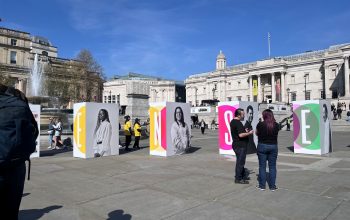The Stanley Picker Gallery reached out to Mind Kingston and Samaritans to offer emotional support for people who had viewed Larry Achiampong’s exhibition, A Letter, A Pledge.
The exhibition is currently showing two 20-minute short films by Achiampong, 40, who describes his life as a father, his strained relationship with his parents, and dealing with his mental health as a black man.
Vicky, the counselling and well-being manager from Mind Kingston, a local mental health charity, said: “It’s about a black man’s experience of therapy with a white female counsellor and how he navigates it is very powerful, it feels very true and familiar.”
The films have distressing themes such as depression, racism, and self-harm. Therefore, the gallery sought the presence of trained mental health volunteers to offer insight and guidance to those potentially triggered by these themes or who want to know more about mental health.
“They got in contact with us, it’s been great to be here, and I spoke with a lot of people. It’s been a very positive experience,” said Vicky.
“It addresses how we open up a conversation and what support counsellors give.”
In the exhibition, The Pledge was depicted through a third-person monologue, voiced by Larry’s son, Sinai Lee Achiampong-Rose.
The father relayed his concerns about his son not having a support system, “afraid he will have to face life abundances alone”.
The Samaritans Engaging Men Earlier handbook, states the support men receive, or lack of it, is a crucial contributor to their mental health.
Most men struggle in silence due to a lack of social groups who can relate to them or show understanding in times of crisis.
Mind Kingston, offers counselling, has drop-in cafes, and even a football team to create welcoming environments for men to discuss their mental state.
“We have a peer support group funded by the NHS,” said Vicky. “It’s one-to-one peer support focusing on individuals’ aspirations and goals, using lived experience of mental health issues as a positive way of connecting with others.”
The aim is to help men become comfortable enough to open up by offering activities which encourage conversation between people by surrounding them with others from a relatable background or with similar interests.
Also in attendance were three volunteers from the Samaritans Kingston branch, Sean, Elore, and Mervayn.
All of them purposefully wanted to keep their surnames anonymous for privacy and safeguarding reasons.
The Samaritans is a suicide prevention charity which has over 150 volunteers in Kingston and more than 22,000 nationwide. The volunteers answer calls every 10 seconds from someone who is considering taking their own life and offer a listening ear without judgment or pressure. In January, the Kingston branch answered 1812 calls and over 300 emails.
Generational trauma
In Achiampong’s film, The Pledge, the son says: “Us black men, we virtually have no one to talk to. It should have been our fathers.”
The Pledge describes a man and his strained relationship with his father and the generational trauma that has passed onto him.
In both films, the director questions what it means to be a good dad, to support his family and how to be a man.
These are hard-hitting topics which in turn negatively affect his mental health.
Data from the Samaritans shows that in the UK, men are three to four times more likely to die by suicide than women.
Factors such as lack of success, substance abuse, and few social connections often leave men feeling isolated and struggling to cope.
“Men are so functional and good at hiding things but when they reach out to us that’s when they feel like they can show what’s on the inside,” said Elore.
“Men find how they come across to people so important, the men that will say they’re the life of the party are often struggling as much as anyone else.”
The exhibition causes us to be more considerate of the factors which affect men’s mental health.
Achiampong’s A Letter looks at immigration, geographical separation between two brothers and life as a British-raised Ghanaian man.
Race and cultural upbringing play a key role in how one relates to Achiampong’s narration.
The Samaritans volunteers said that there has been more work done to support men from minorities and as of recently young Asian men where the build-up of cultural pressures has affected their mental well-being.
The Samaritans Kingston are currently working with men in sports, construction workers and barbers to help “demystify and break down the stigmas surrounding men and mental health”.
Mervayn said: “We meet them where are, one of the highest stats of suicide in sport is among footballers. This is partly because when men don’t meet a certain grade, they feel inadequate.
“With barbers, they often listen to their client’s problems, so they need that listening ear in return.”
A common occurrence they find is that men often keep any negative feelings bottled up.
Within the exhibition, Achiampong-Rose said: “Sometimes when stress compounds at the bottleneck it’s difficult to speak and to breathe.”
The Samaritan’s training includes listening out for key phrases which the volunteers then encourage callers to expand on.
Sean, the third volunteer, said: “It’s one of our superpowers, we identify certain words and help them talk about it.”
Sean advises if someone doesn’t open up initially, talking about your own mental health or sending a text asking how they are, helps them to feel comfortable enough to then speak up.
They emphasised “the art of listening” when creating a safe space to talk.
“It’s important for men to realise it’s normal to experience mental health issues at any stage in life and they can make very good recovery with plenty of help and support,” said Sean.
“A lot of people associate Samaritans with suicide calls but were there for all struggles, it doesn’t matter how small it is but anything which needs emotional support.”
For help with your mental health speak to your GP or get in touch with any one the contacts below:
Samaritans Kingston: Call 116 123, Email jo@samaritans.org
Mind Kingston: Call 0800 028 8000 or visit their website for information.






